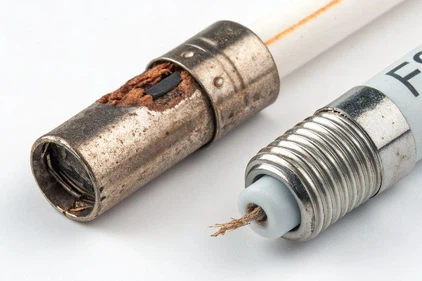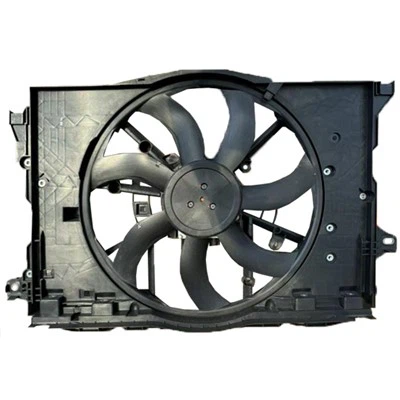Where is the fuse for a radiator fan?
Is your radiator fan not working? The fuse might be the problem. But where do you find it?
The radiator fan fuse is usually in the car's fuse box. This box is often under the hood or under the dashboard. Check the fuse box diagram to find the right fuse. It will be labeled.

Want to know more about radiator fan fuses? Let's explore this important part.
What size fuse does a radiator fan need?
Need to replace the fuse? Getting the right size is key. So, what size do you need?
The fuse size for a radiator fan varies. It usually ranges from 15 to 30 amps. Check your car's manual or the fuse box diagram. This will tell you the correct fuse size for your vehicle.

Choosing the right fuse size for your radiator fan is essential for the safety and proper functioning of your car's cooling system. A fuse that is too small will blow frequently, interrupting the fan's operation and potentially leading to overheating. On the other hand, a fuse that is too large can allow excessive current to flow, which can damage the fan motor or other electrical components.
The best way to determine the correct fuse size1 is to consult your car's owner's manual or the fuse box diagram. These resources provide specific information about the fuse requirements for each circuit in your vehicle. If you're unsure, it's always best to err on the side of caution and use the recommended fuse size.
[1]Understanding the correct fuse size is crucial for preventing overheating and ensuring your car's cooling system functions properly.
It's also important to consider the type of fuse. There are two main types of fuses: standard fuses and slow-blow fuses. Standard fuses are designed to blow quickly when the current exceeds their rated capacity. Slow-blow fuses, on the other hand, are designed to withstand temporary current surges without blowing. Radiator fans typically use standard fuses.
Here's a table summarizing the importance of correct fuse sizing:
| Fuse Size | Effect |
| Too Small | Frequent blowing, fan stops working |
| Too Large | Risk of damage to fan motor and wiring |
| Correct Size | Proper fan operation, circuit protection |
Interested in bulk purchase or OEM of radiator fan?
Check out our **Trade Partners** section → Trusted supplier with 20+ years'export experience
Can a blown fuse cause a radiator fan not to work?
Fan not running? A blown fuse is a likely culprit. So, can a blown fuse stop the fan?
Yes, a blown fuse will stop the radiator fan from working. The fuse protects the fan's circuit. When it blows, it cuts off power to the fan. This prevents the fan from running and can lead to overheating.

A blown fuse is a common reason why a radiator fan might stop working. Fuses are designed to protect electrical circuits from overcurrent. When the current exceeds the fuse's rated capacity, the fuse blows, breaking the circuit and preventing damage to the components.
In the case of a radiator fan, a blown fuse means that the fan motor is not receiving power. This can happen for several reasons, such as a short circuit in the fan motor, a wiring problem, or simply an old and worn-out fuse.
If your radiator fan is not working, the first thing you should do is check the fuse. Locate the fuse box 1and find the fuse for the radiator fan. Inspect the fuse to see if it is blown. A blown fuse2 will typically have a broken wire or a dark spot inside the glass.
If the fuse is blown, replace it with a new fuse of the same size and type. If the new fuse blows immediately, it indicates a more serious problem in the circuit, such as a short circuit. In this case, you should consult a qualified mechanic to diagnose and repair the problem.
[1]Knowing the location of your car's fuse box is essential for quick troubleshooting. This guide will help you find it easily and efficiently.
[2]Understanding the causes of a blown fuse can help you prevent future issues with your radiator fan. Explore this link for detailed insights.
What happens if my radiator fan fuse is too small?
Using the wrong size fuse can cause problems. What happens if it's too small?
If the radiator fan fuse is too small, it will blow repeatedly. This happens because the fan draws more current than the fuse can handle. This will keep the fan from working and can be frustrating.

Using a fuse that is too small for your radiator fan circuit is a recipe for frustration. The fuse is designed to protect the circuit from overcurrent, but if it's too small, it will blow every time the fan tries to start or run at full speed.
This happens because the radiator fan draws a certain amount of current to operate. If the fuse is rated for less current than the fan requires, the fuse will overheat and blow. This will interrupt the fan's operation and can lead to overheating, especially in hot weather or when the car is under heavy load.
Replacing the fuse with a larger one might seem like a quick fix, but it's not recommended. A larger fuse will allow more current to flow through the circuit, which can damage the fan motor or other electrical components. It can also create a fire hazard.
The best solution is to use the correct fuse size for your radiator fan circuit1. Consult your car's owner's manual or the fuse box diagram to determine the appropriate fuse size. If you're not sure, it's always best to err on the side of caution and use a slightly larger fuse than you think you need. However, never exceed the maximum fuse size recommended by the manufacturer.
[1]Understanding the correct fuse size for your radiator fan circuit can prevent overheating and potential damage to your vehicle's electrical system.
The radiator fan fuse is vital. Know where it is, use the right size, and replace it if blown. This keeps your cooling system working right.

Radiator Cooling Fan Factory in China
While we're here solving fuse issues, we also design and manufacture high-quality automotive cooling fans for distributors, workshops, and automotive brands.
Interested in OEM or bulk orders? Explore our Trade Partners program














